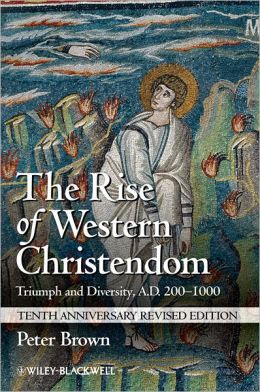It was just ten years ago that I did a small HeRB piece (here) on the insignificance of Thai church history in the larger scheme of things. I also noted that, "What is endlessly fascinating to me, however, is that from the 'inside' the field seems huge. Even Protestant history in Thailand has more to it than any one or two scholars can possibly encompass; and, of course, the issues involved in the study of Thai church history are as broad in many ways as the global church itself."
Peter Brown's The Rise of Western Christendom (10th Anniversary Revised Edition, 2013) offers a number of fascinating cases making that last point concerning the breadth of the history of Christianities in Thailand. According to Brown, one of the most fascinating and significant similarities is the question of the relationship of converts to their pre-Christian past and how that relationship is understood by those in positions of ecclesiastical power. In his discussion of the 6th and 7th centuries, Brown observes that in the Eastern Roman Empire church leaders tended to dismiss "paganism" as something that had been defeated and thus was inconsequential. They treated remaining traces of the pagan past with a degree of tolerance.
Such was not the case in the disintegrating Empire in the west. There traditional religions remained more influential and ecclesiastical authorities tended to think that the pagan past was powerful and dangerous. That is, "each believer had to continue, even after conversion and baptism, to battle with the tenacity of evil customs with himself or herself." Thus, "paganism was now seen to lie close to the heart of all baptized Christians. It was always ready to re-emerge in the form of 'pagan survivals.'" (p. 150)
In early Thai church history, the missionaries including esp. the Presbyterians clearly shared the western view rather than the eastern. It would be fascinating, in fact, to see if a direct line could be traced through the centuries linking 6th century western European views on paganism to 19th and early 20th century American Presbyterian missionary views of Buddhism. I suspect there is a link, but even if there is not a direct one the two eras shared a general concern over the influence of the past on converts. Conversion was never complete. For the Presbyterian missionaries, this was not so much a matter of moral behavior (although at times they did worry about convert morals as well) as it was a question of beliefs and religious practices. Converts, for example, had a troubling habit of continuing to rely on traditional medical practices when missionary doctors weren't readily available—and sometimes even when they were. If Brown is correct, the eastern churches would have tended to dismiss such a reliance as nothing more than an inconsequential leftover from the pagan past—or, in this case, the traditional religious past of the Thai convert. The missionaries, however, saw convert reliance on traditional medicine as a clear indication that they had not fully converted to their new religion. They were still in danger of slipping back into their "heathen" past.
In other words, the missionaries could not entirely trust converts because they showed clear evidence of not having made a full change from the past. Traditional village Buddhism and animism remained potent in them. My own study of Thai church history in northern Thailand early on led me to the conclusion that this lack of trust between the missionaries and converts had devastating consequences for the churches that emerged from missionary efforts. At the close of, Khrischak Muang Nua (1984), I wrote, "The summary of everything that I read [in Presbyterian missionary records] is this: the Laos Mission [in northern Siam] persisted in demeaning, decapitating, dismembering, and ignoring the church it was supposed to train up, to raise up." A little harsh, perhaps, but that was 30 years ago! The larger point that mistrust was a fundamental element in missionary-convert relations remains true.
What is fascinating is to find in Brown a couple of insights. First, this kind of mistrust of conversion and converts goes back a long, long way in Christian history. Second, "back then" not every corner of the larger church shared that lack of trust. One point that is different is that in the 6th century those who were in positions of power shared the culture and ethnicity of those they mistrusted. Ultimately, every body was in the same boat. Such was not the case in earlier Thai church history. In their own thinking, the missionaries did not share in the dangers of conversion because they weren't converts. They came, in their own thinking, from a fully Christian culture and society. That difference has injected a major complexity into Thai church life that continues to have an impact on it down to the present, esp. since most of the missions that entered Thailand after World War II exhibited much the same basic orientation to missionary-convert relations that marked earlier Presbyterian work.
